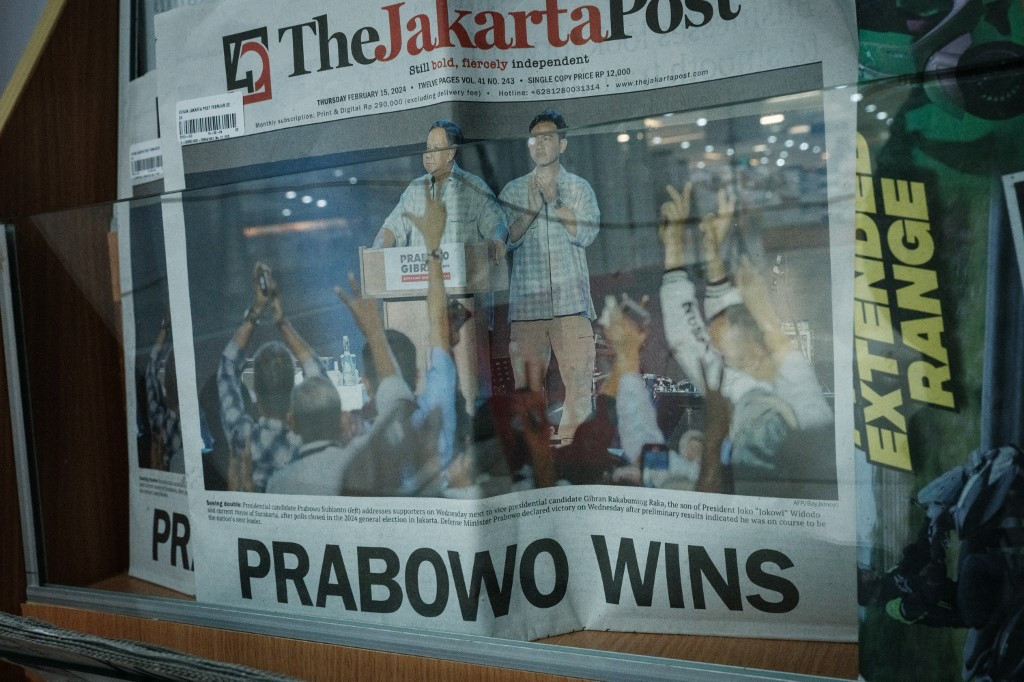Popular Reads
Top Results
Can't find what you're looking for?
View all search resultsPopular Reads
Top Results
Can't find what you're looking for?
View all search resultsHuman-centered journalism
While the internet, and later social media, have created seismic changes in the media industry by disrupting how news and content are distributed and monetized, if we are to believe proponents of AI, the change that is coming will be even more fundamental.
Change text size
Gift Premium Articles
to Anyone
 The front page of 'The Jakarta Post' newspaper shows Defense Minister Prabowo Subianto (left) and Surakarta Mayor and President Joko “Jokowi“ Widodo's eldest son Gibran Rakabuming Raka at a book store a day after the countrys presidential and legislative elections in Jakarta on Feb. 15, 2024. (AFP/Yasuyoshi Chiba )
The front page of 'The Jakarta Post' newspaper shows Defense Minister Prabowo Subianto (left) and Surakarta Mayor and President Joko “Jokowi“ Widodo's eldest son Gibran Rakabuming Raka at a book store a day after the countrys presidential and legislative elections in Jakarta on Feb. 15, 2024. (AFP/Yasuyoshi Chiba )
As The Jakarta Post celebrates its 41st anniversary today, journalism may be on the cusp of something revolutionary.
The internet and later social media may have created seismic changes in the media industry by disrupting how news and content were distributed and monetized.
But if we are to believe proponents of artificial intelligence (AI), the change that is coming will be even more fundamental.
If anything, AI, especially generative AI, has the potential to change the nature of journalism itself.
Optimists have already been talking about machines, especially those powered by generative AI, replacing journalists and conducting basic tasks in journalism, from gathering information to publishing news, whether that be audio, video or text.
And we are not talking about something far in the future.
Search giant Google has already developed a tool, named Genesis, which will allow publishers to carry out the news-gathering process, combining materials from PDFs, transcripts, audio and video sources using AI. The tool, which has undergone testing by a number of publishers, will also help publishers create things like analyses, summaries or turn text into scripts and audio.
Some publishers, like JP Politikens in Denmark, have built their own AI models to help transition the newsroom into a more efficient, AI-powered one.
Domestically in Indonesia, with revenue from advertising continuing on a downward trajectory while the cost of manpower keeps rising, many media outlets have started to use AI to do the work.
As an industry, journalism has not been doing well over the last 15 years and it is easy to understand why publishers are eager to embrace AI as their savior.
But as with other new technologies that promised salvation, AI, especially if we are talking about the current iteration of generative AI like ChatGPT, is not without its pitfalls.
There are already admissions from developers of AI that their language models can perpetuate racial and cultural biases. It is easy to imagine what kind of crime stories ChatGPT would spew out if editors simply typed in prompts like "black, guns, robbery."
It seems that leaving the work of journalism to AI in this day and age is still a risky enterprise.
At the end of the day, journalism is about writing human stories for human readers, and unless the ultimate goal of a media company is to write as many news stories as possible to be indexed by search engines, human-centered journalism should be at the heart of any journalistic endeavor.
We at the Post engage in journalism first to inform you, readers, about updates from Indonesia – a job that could now be easily replaced by AI.
But rather than simply being an information engine, the Post also provides context, background and analysis to audiences the world over who may be newly introduced to Indonesia, one of the world's largest Muslim democracies and Southeast Asia's largest economy.
We believe this is a job too important to be left to AI and should be in the hands of well-sourced journalists, editors and writers who cover Indonesia on a daily basis.
We are all aware that even some of the best-intentioned journalists can make mistakes, as we can see from the "beheaded baby story" published in some of the most prominent news outlets in the West.
The war in Gaza has shown us how inherent bias among journalists can lead them to parrot propaganda materials published by parties in the conflict.
It is probably not a good idea to add AI into the mix – at least for now.
As we celebrate our 41st anniversary today, we'd like to raise a glass to journalists, editors and publishers who continue to champion the truth and put natural human intelligence at the center of the enterprise.










